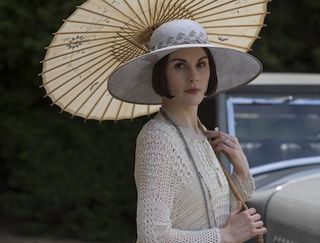Dear ‘Abbey’: ‘English Version of a Happy Ending' Is Happy Indeed

From a very young age, we learn that decent people who dwell in giant manor homes end up living happily ever after, and that certainly was the case on Sunday’s Downton Abbey finale. After six seasons and 52 episodes, there were a good 20 characters who needed some degree of resolution, so sticking the landing was no small maneuver for creator Julian Fellowes and his writers.
They pulled it off. Thomas Barrow, the show’s “recovering Cruella de Vil,” according to Matthew Gilbert of the Boston Globe, left behind his conniving ways and landed his dream job. Carson’s once unthinkable exit from Downton was laid out hastily before him and didn’t actually sound that bad. Anna and Bates were free from felonious suspicion at last, and had a baby. Ice Queen Mary too had a baby coming.
Perhaps most unlikely, luckless Lady Edith was finally wed—to an exceedingly decent, well-born man, no less.
“They'll be happy enough,” snarked Violet about the Edith-Bertie nuptials. “Which is the English version of a happy ending.”
Of course, what was a finale for us here in the States March 6 occurred at Christmas time across the Atlantic. Here’s what the Daily Mail had to say about the finale in late December: “And they all lived happily ever after – even Edith! Downton Abbey saw enough syrupy sentimentality to make even the most ardent fan gag... but with a Christmas finalé, how else could it end?”
The series actually ends not on Christmas, but on New Year’s Eve, everyone toasting the new year—and what’s a new era for the Crawley clan and Britain’s upper crust in general. The Crawleys hit the pending year on a bit of downscale slide: Amidst his budding bromance with Tom, Mary’s husband Henry has opened what appears to be a cross between a used car lot and a mechanic’s shop. The family swaps out the prideful Carson—beloved, stone-faced emblem of the era—for slippery malcontent Thomas. And it’s suddenly harder to staff Downton than it is your local Blimpie’s.
It all felt very wonderfully British to me, though the New York Times saw fit to call the finale “an American happy ending”:
Haven’t we loved these foolish Granthams with all the fervor of their countrymen? Don’t we have the operational tear ducts to prove it? And when that Scottish songstress Mrs. H launched into Bobby Burns’s old lyric “Auld Lang Syne,” didn’t we ache at the thought of leaving behind these silly, maddening, wonderful people?
Downton Abbey and its residents were no more real than Middle-earth and, in the end, how little that mattered. We asked them into our homes, and when their time was done, we sent them on their way.
The Globe’s Gilbert imagined an alternative ending, one far darker and “more akin to Thomas Hardy than Austen":
Edith would have continued to feel disgrace and alienation, living out her life as a symbol of how unkind history could be to women. The servants would have lost their jobs, with Daisy forced to sell flowers and apples — or worse — on the streets. Robert would have demanded that Cora stop working at the hospital, and she would have obeyed.
But Fellowes went for optimism, focusing on the positive developments of the era. He gave us all sweet dreams, and I can’t deny that I enjoyed every minute of it.
Hey, I did too. This bundle of unbridled happiness—not unlike Baby Boy Bates—was an appropriate Christmas gift for viewers in the U.K. Here in the States, we’re stuck in the winter doldrums, between holidays, so the satisfying wrap-up to a masterpiece series, treacly as it may have been, was a welcome treat as well.
Broadcasting & Cable Newsletter
The smarter way to stay on top of broadcasting and cable industry. Sign up below
Michael Malone, senior content producer at B+C/Multichannel News, covers network programming, including entertainment, news and sports on broadcast, cable and streaming; and local broadcast television. He hosts the podcasts Busted Pilot, about what’s new in television, and Series Business, a chat with the creator of a new program, and writes the column “The Watchman.” He joined B+C in 2005. His journalism has also appeared in The New York Times, The Philadelphia Inquirer, Playboy and New York magazine.

